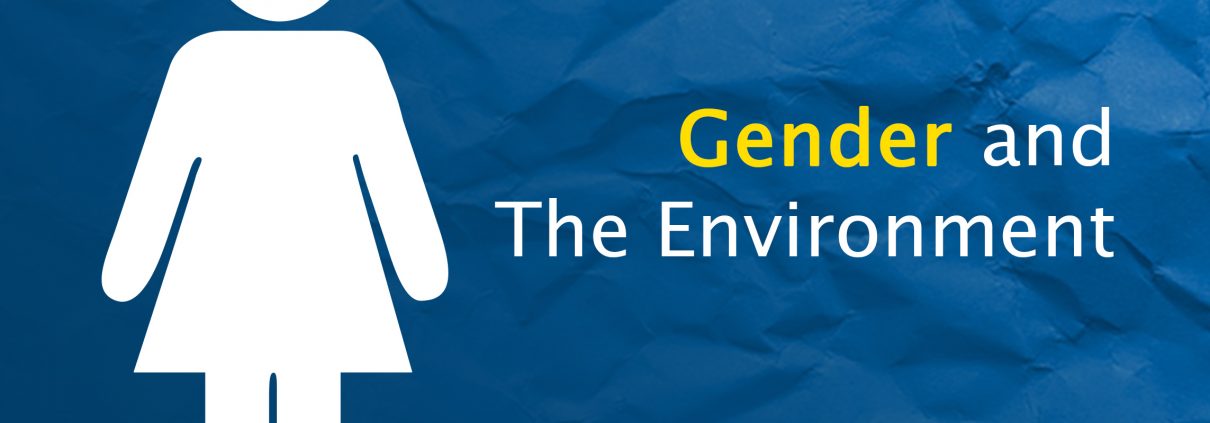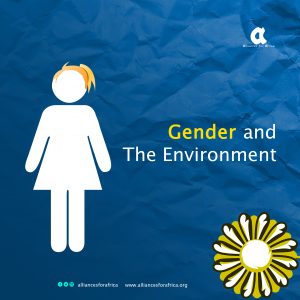
GENDER (WOMEN) AND THE ENVIRONMENT
GENDER (WOMEN) AND THE ENVIRONMENT
Environment is one word that has become very popular in the past decade due to the undesirable effect of climate change. What comes to mind when we hear the word environment is our surroundings, trees, water, air, the animals around us and a lot more. The environment is the essence of our very existence and without it there will be no life and no culture to uphold.
From time immemorial, women have been the strong link between the environment and humanity. Before a child is born, the mother is the sole medium by which it has contact with the biophysical environment and earth as we know it.
This then begs the questions of how the environment ought to be treated and cared for because humans rely on the natural resources (land and water) from the environment for their survival and the survival of those that depend on them (the survival of their dependents).
Women’s reliance on the environment for their daily needs particularly makes them vulnerable as they are the worse hit of environmental pollution. It is worthy to note that the relationship between women and the environment is not new, and that women’s interaction with the environment is as a result of social behaviours that have prescribed specific roles to the woman which is reflected in the public and household tasks that she performs.
According to Anne Oakley, she opined/ demonstrated that gender roles in our society are acquired through the process of socialization rather than by biological determination, stating that it is such a deliberate and intentional act that it has become our default. So, we will not be far from the truth if we state that due to the defined roles of a woman in society, she interacts more with her environment and therefore, she is at a higher risk of exposure to environmental pollution.
The environment is a beautiful treasure which promotes human well being through the various services it provides such as food, medicine, weather, aesthetic and cultural benefits. However, due anthropogenic activities arising from development and urbanization, the environment has been negatively impacted by various types of pollution such as chemical pollution from pesticide use, air pollution from burning fossil fuels, water pollution from oil spill and use of chemicals during fishing.
As firewood gatherers, fisher-women, farmers and home managers, women are usually at higher risk of being exposed to environmental pollution. Occupational roles, household responsibility and biological susceptibility are some of the factors that impact gender differently in terms of environmental pollution. Women are more affected by sicknesses as a result of environmental pollution because in the course of carrying out household chores, the risk of being exposed to toxic substances contained in cleaning and laundry products, pesticides, and solvents is very high. Also, women are more likely to use cosmetics such as make up, perfumes, hair and skin products which may contain potentially harmful chemicals. Research has shown that because women have on average 10 percent more body fat than men, they are able to store more fat soluble toxins such as persistent organic pollutants (POPs). In most developing countries, women are the ones responsible for gathering wood used as fuel for meal preparation. They also spend the most time in kitchen where they are exposed to particulate matter and other pollutants coming out of the stoves and open fires. Research has also shown that women have a higher risk of contracting diseases related to air pollution exposure due to lack of access to modern, cleaner energy sources.
According to a joint report published by the United Nations Food and Agriculture Organization (FAO) the UN environmental Programme (UNEP) and the World Health Organization (WHO), developing countries use 25% of the world’s production of pesticides, however, 99% of poisoning due to pesticide use occur in developing countries, where practices are less regulated due to weak regulating systems/ polices and therefore less strictly adhered to.
The role of women in society is undoubtedly multifaceted as displayed in the duties they perform both in their domestic life and in the public sphere. Her crucial role cannot be overemphasized as she can push for more sustainable policies that help to preserve the natural environment which inadvertently helps to safe guard her life, that of her family and of the future generation. Unfortunately, women are still significantly excluded from decision making processes related to environmental policies despite their close proximity to nature. For us to progress/ develop consistently into a society with a more sustainable principles, there is need for more active participation of women in the decision making process of formulating environmental policies as she can put into consideration issues concerning not only her but that of her children, family and the society at large.
However, it is refreshing to know that all hope is not lost when women like Amina Mohammed, the former Minister of Environment and current Deputy Secretary-General of the United Nations is raising her voice for more sustainable ways to carry out our daily activities in the environment. The late Wangari Maathai, was a Kenyan environmental Political Activist who advocated the importance of tree planting and was awarded the Nobel Peace Prize for her contributions to sustainable development, democracy and peace. There are more women lending their voices to ensure sustainable environmental well-being for our present benefits without compromising the benefits of the future generation. However, more is required to have the safe environment we all deserve because everyone has a right to total (complete) well-being.
Nigeria as a developing country is yet to get it’s environment together, in a bid to manage and control widespread environmental degradation, Nigeria formulated policies that are either obsolete or fragmented. The process of formulating environmental policies, lacks the peoples’ participation and engagement, especially that of women who consistently relate with the environment in everyday activity. Women’s contribution to environmental policy and practices is critical to preserve ecological balance. How then can we avert environmental degradation without exploring the contributions of women in environmental policy formulation and planning? How many women are there in the tables of decision making on environmental issues?
Let’s not be gender biased nor promote sexism either by assigning key environmental policy formulation roles to men alone for women are most affected by environmental degradation and their role in managing natural resources is critical to sustainable development.
As we approach 2019 general elections, we hope to use this medium to draw attention to our Nigeria minimal quota system by the National gender Policy that stipulates that women take up 35% of decision-making roles. By either election or appointment, we hope to see credible women in decision-making positions across all states and economic sectors. From the legislative positions at the senate and house of representative, to the federal and state ministries of Environment and Agriculture, let us have more women in these strategic key decision-making positions as drivers of ecological balance and sustainable environment in line with the United Nations Sustainable Development Goal 15 to protect our environment.


